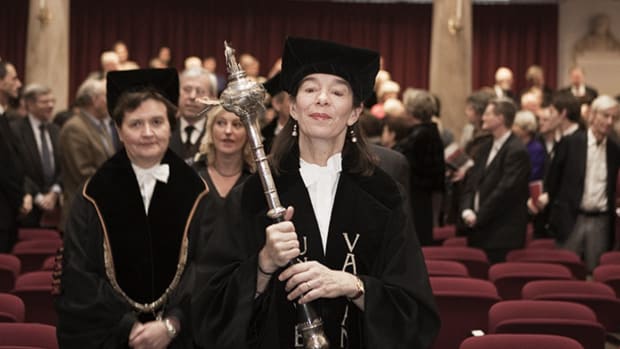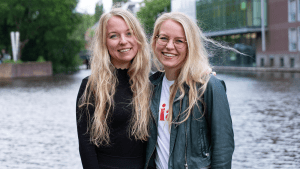
Sounds obvious, yet being kind to yourself can ease anxiety and depression among PhD students
Are you a PhD student or young scientist? Then you are six times more likely to develop mental health issues such as anxiety and depression as a result of your work than the average person in the Netherlands. What helps? Self-compassion, according to Luisa Solms, who is doing a PhD in occupational psychology. “It sounds fluffy, but it really helps.”
Luisa, what is self-compassion?
“Simply put, it means treating yourself the way you would treat a friend. The concept was developed by American psychologist Kristin Neff and is based on mindfulness. Mindfulness is a cognitive skill that teaches you to reflect on what you are feeling at that moment without judgement.”
How does that help PhD students?
“As a PhD student, you are often confronted with setbacks: for example, when a paper is rejected. We often respond with self-criticism. For example, that you are not suited to science. If you respond with self-compassion, you support yourself. That starts with reflecting on the feelings that the rejection evokes. You can then see it as something that happens not only to you but also to others: the fact is that everyone in science has to deal with rejection. When we feel bad, we isolate ourselves, but the realisation that others are also dealing with these things can actually encourage us to seek help. Perhaps you will talk to a colleague or put the paper aside for a few weeks.”

Doesn’t self-compassion make you lazy?
“You often hear that prejudice. But research shows that people who have more self-compassion are less afraid of making mistakes. If you allow yourself to fail, you have a safe haven from which you can experiment and take risks. That sounds fluffy, but research shows that people who have self-compassion are actually more motivated to improve themselves.”
Where have we lost our self-compassion?
“That’s a good question. I imagine it has to do with culture: the constant focus on being productive and better than others – in science but also in business – makes it harder to be kind to yourself. Also, people who work in science are often critical, not only of others but also of themselves. As a result, they often have more difficulty with self-compassion.”
How do you cultivate more self-compassion?
“You can train yourself to do that. Kristin Neff’s website has all kinds of exercises. We have developed a training programme for PhD students that consists of a very short meditation in which the students briefly recall negative events (not traumas). We asked them to be mindful of the moment, to see the event as something that happens to others too, and to find a supportive inner voice. It only takes three minutes.”
And what were the results?
“We saw an improvement in the well-being of PhD students. They felt less work pressure and were more likely to seek help. We also saw that they had more positive emotions after the training.”
Doesn’t this intervention place too much responsibility on the PhD students?
“We do indeed have to be careful not to place all the responsibility on the individual. You can have as much self-compassion as you like, but if you work in an environment where you are constantly faced with rejection, or have a supervisor who makes you feel that you are not doing well, it is very difficult to maintain that self-compassion. What would help is if supervisors also shared their experiences of how they themselves deal with setbacks.”
“Self-compassion is not the only solution: universities must also reflect on the pressure they place on academics, such as to publish in a particular journal. In addition to publications and grants, there should also be recognition for the effort that a PhD candidate puts in, regardless of the result. Ultimately, every employee wants to be seen, and by only recognising certain outcomes, you are doing many people a wrong. Sometimes it can also be enough to knock on someone’s door and have a chat or give a compliment.”
Luisa Solms will defend her PhD thesis From Work Pressure to Work Pleasure: Understanding and Improving Well-Being in Academia on Tuesday 24 September at 1 p.m. The defence will take place in the Agnietenkapel.



